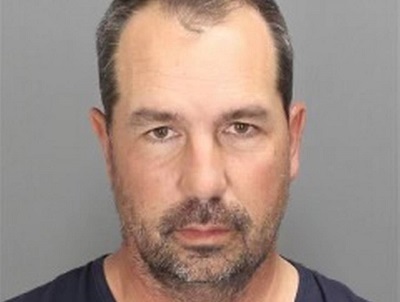
Credit: Oakland County Jail
In September 1999, a woman was raped at the Twin Lakes Golf Course in Michigan. In July 2000, a woman was raped at the Blue Course Golf Course at Penn State University.
Despite the 400+ miles separating the crime scenes, investigators have linked a now-51-year-old man to both of the crimes through DNA and investigative genetic genealogy.
Sexual assault kits were performed following both rapes and DNA was obtained and uploaded to CODIS. However, neither crime had witnesses, surveillance cameras or other physical evidence, and both cases went cold quickly.
Then, in 2004, a CODIS search showed the DNA profile from the 2000 Penn State rape kit matched another sample taken from a 1999 Michigan rape. The investigators quickly realized the circumstances of the cases were even similar.
A young woman was working at the Twin Lakes Golf Course when a white male approached asking for directions to the clubhouse. He then waited until she was alone behind a building, threatened her with violence, and raped her.
Less than a year later, a 19-year-old woman was jogging by the 18th hole of the Blue Course Golf Course at Penn State University when she was also approached by a white male asking for directions to the clubhouse. When she tried to leave the area, the man grabbed her from behind and held a knife to her throat. He then physically assaulted her, dragged her to a nearby wooded area and raped her.
Still, even linking the two crimes to the same person through DNA, investigators in neither state had a potential suspect.
Luckily, in 2011, then-Penn State detective Ryan Olson filed a criminal complaint against “John Doe,” whose DNA matched the perpetrator’s profile in order to preserve the statue of limitations should any agency develop a lead in the future—which is exactly what happened.
Witnessing the power of investigative genetic genealogy in two prior cases, Penn State police detective Nick Sproveri reopened the investigation in July 2021.
While the suspect’s profile has been genetically marked, the DNA sample from the rape kit had been destroyed previously according to Pennsylvania law. However, the Oakland County (Michigan) Sheriff’s Office still had the 1999 DNA sample from the rape kit. That sample was then sent to Parabon Nanolabs for analysis and genealogical research.
In January 2023, Parabon returned a lead pointing to three brothers with the last name Rillema. Investigators looked into all three brothers, eventually settling on Kurt Rillema due to age, similarity of physical features as described by the victims and location at the time of the crimes. In 1999, Kurt Rillema lived close to the Twin Lakes Golf Course, and in September 2000, he was likely visiting one of his brothers who attended Penn State. Additionally, Oakland County Sheriff Michael Bouchard described Rillema as an avid golfer who has played all over the country.
On Jan. 31, 2023, investigators surreptitiously collected Rillema’s discarded Styrofoam coffee cup. The cup was sent to the Michigan State Police crime lab for testing and was found to math the DNA profile of the perpetrator in both the 1999 Michigan rape and the 2000 Penn State rape.
Rillema had no criminal history prior to this arrest, and Bouchard confirmed he was not on any agency’s radar as a person of interest or potential suspect. The sheriff also did not discount the possibility that these two women are not Rillema’s only victims.
“Who knows if there are other victims out there,” he said. “We know a lot of sexual assault victims do not make a report. If you are a victim of a similar circumstance, a rape on a golf course, please let us or your local police know.”